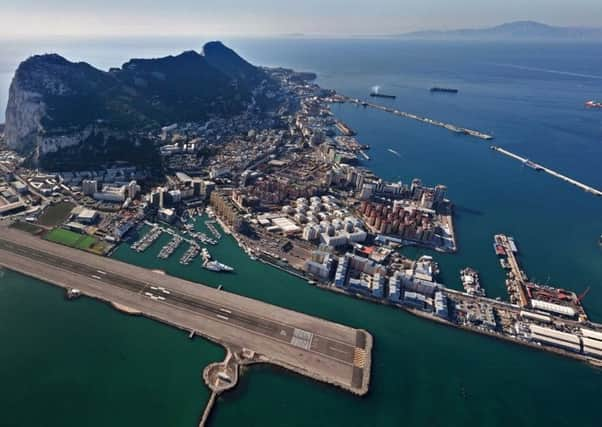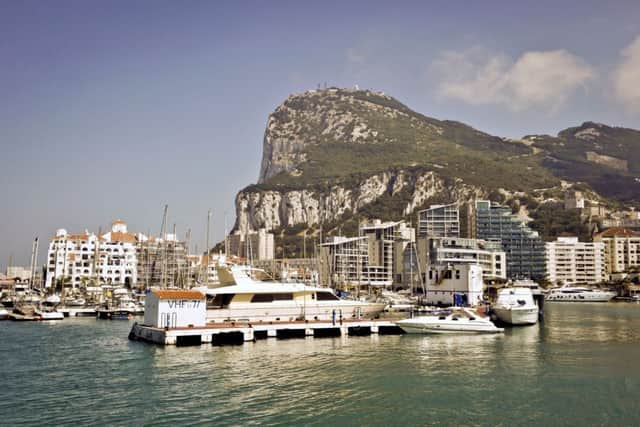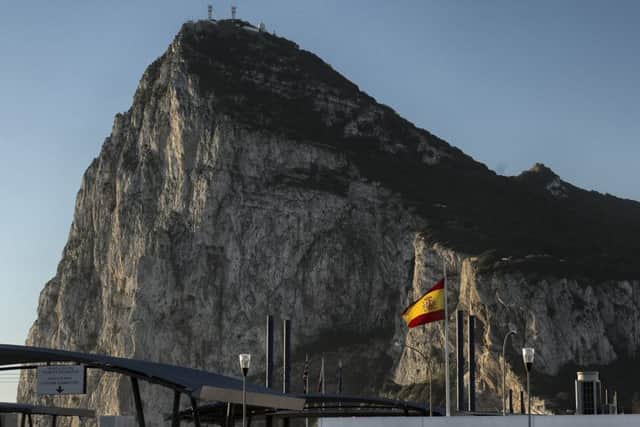Lesley Riddoch: Gibraltar row makes Scottish EU case stronger


A lot of politicians have made weekend howlers over Gibraltar.
Take poor Willie Rennie.
He made Sunday headlines suggesting Spain would veto EU membership for an independent Scotland a la Gibraltar. Sadly the same day, the Spanish foreign minister Alfonso Dastis, confirmed that won’t happen. “We don’t want it [Scottish independence] to happen. But if it happens legally and constitutionally, we would not block it.”


Whoops.
Advertisement
Hide AdAdvertisement
Hide AdThen Michael Howard drew a parallel between the present Gibraltar dispute and the Falklands War – both conflicts sparked by “Spanish-speaking countries”.
The former Tory leader raised eyebrows on the Andrew Marr show yesterday by observing; “Thirty-five years ago this week another woman Prime Minister sent a task force to defend the freedom of a small group of British people against another Spanish-speaking country.


“I’m absolutely certain our current PM will show the same resolve.”
As one tweeter put it “Armada, armada.”
This gung-ho, aggressive attitude is precisely what scunners many Scots with British political culture, differentiates British political leaders from their more cooperative European counterparts and is exactly why Theresa May and the case for Scotland remaining in the Union is likely to come a cropper during the Brexit process
Of course, I’m not suggesting Michael Howard is a key member of the Brexit team. But his attitude is evidently shared by many Westminster politicians and members of the press. “How dare other nations try and flex territorial muscles when Britain is centre stage. How dare someone rev the engine when old lady Britain is trying to get off the bus. Don’t they know the (unwritten) rules? We matter – pesky claims about tiny territories don’t.”


Now of course no-one has said that – aloud. But actions speak louder than words.
There was no mention of Gibraltar in Theresa May’s Article 50 letter to Brussels.
There has been no thought given to the Irish border problem and no formal answer to Nicola Sturgeon’s options paper delivered to Number Ten last December. The Welsh First Minister, Carwyn Jones summed up the problem succinctly after Theresa May’s Cardiff visit last month; “She doesn’t understand devolution”. Happily though most European states do. So while London’s Brexit focus is finding fixes to let the City of London, Nissan, and the car industry keep operating inside the EU – and to win the next election – the EU and its member nations will insist on a fairer process that requires the negotiation not imposition of deals.
Advertisement
Hide AdAdvertisement
Hide AdThat’s why the current stooshie over Gibraltar may not be as serious as the horrified British press are making out.


The tiny territory at the entrance to the Mediterranean hurtled into the news last week when the EU’s guidelines for Brexit negotiations suggested Spain should be given a power of veto over future arrangements. Perhaps Spain was egged on by the absence of a special mention for the Rock in Theresa May’s Brexit letter. But if British interest in Gibraltar is equivocal, the attitude of the Gibraltarians is not.
In a 2002 referendum, they rejected even partial Spanish sovereignty. Since then Spain has not disputed that Gibraltar is legally a British territory.
Of course, General Franco did close the 1.2 kilometre border in 1969 and it didn’t fully reopen until February 1985 after decades of disruption.
So perhaps this flexing of Spanish muscle is a knee-jerk response from a power, which has been as imperial in its territorial ambitions as Britain itself. Who knows yet.
But one thing is certain.
The way this dispute is handled matters hugely to the 30,000 folk on the Rock. So it behoves the British to get off their warhorses and tread carefully in negotiations. It also might be an idea for the Gibraltarians to consider whether a different partner than either Spain or the UK might soon be necessary to take responsibility for “external relations” within the EU.
Gibraltar has a hugely powerful parliament of its own – indeed the idea of “saving” poor wee Gibraltar is completely wrong.
Like the tiny Faroes, Gibraltar easily contradicts that empty claim about Scotland having “the most powerfully devolved parliament in the world”.
Advertisement
Hide AdAdvertisement
Hide AdThe Gibraltar parliament – formed in 1969 – has 17 members drawn from a single constituency and a nominated speaker and sends no MPs to sit in Westminster. That speaks volumes about the level of control exercised on the Rock.
The Gibraltar parliament controls every aspect of domestic policy including energy and the economy and, like Scotland, has its own independent judiciary and Supreme Court of Justice. The UK government is responsible for defence, foreign policy and internal security and has negotiated some useful EU exemptions for Gibraltar which has been inside the EU but outside the customs union, VAT area and Common Agricultural Policy. Where there is a British will, it seems there actually is a way to manage political difference.
But for how much longer?
The Lisbon Treaty which set up the modern EU says it applies to “the European territories for whose external relations a Member State is responsible.”
Having the UK assume that responsibility was useful when Britain was in the EU – but that will soon be over.
Is joint UK/Spanish sovereignty an option? Although Gibraltarians speak Spanish and travel regularly into Spain, they fear their large town/mini-state will lose autonomy, status and tourist traffic if it becomes just another Spanish town and loses the cache of its present anomalous position. Gibraltar’s first minister Fabian Picardo says sharing sovereignty “would strip us of who we are”.
But theoretically, Gibraltar could resolve its EU/UK dilemma by asking another EU member to take over external affairs from the UK. Like the Irish or Portugese or even… an independent Scotland.
Is that currently the talk of the Rock? Not yet.
But as the ripples from a hard Brexit threaten to overwhelm delicate arrangements in sensitive border locations, the unthinkable will soon be thought. And Scots will notice all sorts of deals are being hatched to connect some parts of the UK state with the EU – including Gibraltar, Ireland and the City of London. Each time one of these “little local British difficulties” is swept out from under the carpet by the EU, Scotland’s case for special treatment or an independence referendum surely advances.
Are Scots really willing to sit at the back of the table and watch their nation become the only interest that isn’t in with a single market shout?
